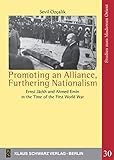Promoting an Alliance, Furthering Nationalism : Ernst Jäckh and Ahmed Emin in the Time of the First World War / Sevil Özçalık.
Material type: TextSeries: Studies on Modern Orient ; 30Publisher: Berlin ; Boston : De Gruyter, [2020]Copyright date: ©2020Description: 1 online resource (252 p.)Content type:
TextSeries: Studies on Modern Orient ; 30Publisher: Berlin ; Boston : De Gruyter, [2020]Copyright date: ©2020Description: 1 online resource (252 p.)Content type: - 9783879974719
- 9783112209394
- online - DeGruyter
- Issued also in print.
| Item type | Current library | Call number | URL | Status | Notes | Barcode | |
|---|---|---|---|---|---|---|---|
 eBook
eBook
|
Biblioteca "Angelicum" Pont. Univ. S.Tommaso d'Aquino Nuvola online | online - DeGruyter (Browse shelf(Opens below)) | Online access | Not for loan (Accesso limitato) | Accesso per gli utenti autorizzati / Access for authorized users | (dgr)9783112209394 |
Browsing Biblioteca "Angelicum" Pont. Univ. S.Tommaso d'Aquino shelves, Shelving location: Nuvola online Close shelf browser (Hides shelf browser)
Frontmatter -- Table of Contents -- Acknowledgement -- Introduction -- 1. Two Influential Figures of the German-Ottoman Alliance: Ahmed Emin (Yalman) and Ernst Jäckh -- 2. The Turkish Appropriation of German Nationalism -- 3. The Self Positioning of Ahmed Emin and Jäckh in their Post-War Writings -- Conclusion -- Bibliography
restricted access online access with authorization star
http://purl.org/coar/access_right/c_16ec
This book investigates how the German-Ottoman Alliance affected the Turkish Nationalism during the Second Constitutional Period (1908–1918), focusing on two lesser known but crucial players of the Alliance: Ahmed Emin (Yalman, 1888–1972) and Ernst Jäckh (1875–1959). After the First World War, both men had reputations as being liberal, pro-American journalists. This book explores their papers and investigates their wartime activities and connections, and shows how they helped the German-Ottoman Alliance to take root. Ahmed Emin, a graduate of the German School in Istanbul, was sent by the Ottoman Minister of War, Enver Pasha, to the German Front during World War I and through his German and Turkish writings, advocated strongly for the promotion of the German-Ottoman Alliance. Ernst Jäckh was a consultant to Emperor Wilhelm II in his Eastern affairs and made several trips to the Ottoman Empire. In the process he built up a reputation as being »Turkish-Jäckh« among German imperialist circles due to his Young Turkish connections. Through their writings and the various institutions they enrolled, they both became key figures of the German-Ottoman Alliance. Also by evaluating the writings of the Ottoman political elite of the Era on Germany this book shows how the so-called »German spirit« was constructed by the Ottoman political elite, including Ahmed Emin. It also clarifies how certain elements of German nationalism were appropriated into Turkish nationalist thinking by the channel of German imperialists, including Ernst Jäckh. Opposing the comview that the support for the German-Ottoman Alliance was limited only to a certain clique of the Committee of Union and Progress, this book seeks to answer how the »mainstream intellectuals« of the Second Constitutional period who supported the Alliance protected their reputations after World War I, and how this German-Ottoman Alliance gave Turkish nationalism a German
Issued also in print.
Mode of access: Internet via World Wide Web.
In English.
Description based on online resource; title from PDF title page (publisher's Web site, viewed 27. Jan 2023)









